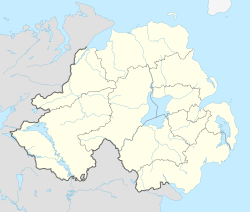Finaghy
This article includes a list of general references, but it lacks sufficient corresponding inline citations. (November 2010) |
Finaghy
| |
|---|---|
 | |
Location within Northern Ireland | |
| Irish grid reference | O003360 |
| District | |
| County | |
| Country | Northern Ireland |
| Sovereign state | United Kingdom |
| Post town | BELFAST |
| Postcode district | BT10 |
| Dialling code | 028 |
| NI Assembly | |
Finaghy (/ˈfinəxi/ [1] or /ˈfɪnəki/; from Irish an Fionnachadh, meaning 'the white field')[2] is an electoral ward in the Balmoral district of Belfast City Council, Northern Ireland. It is based on the townland of Ballyfinaghy (from Irish Baile an Fhionnachaidh).[3] There has been a small community living in the area since the 17th century, and it has been involved in the production of linen, which was key to the Lagan Valley area at the time.
History
[edit]In the 1930s, the community gradually started to grow; the local Presbyterian church was founded in 1936. In the 1950s, the city of Belfast grew outwards. Housing estates were built in Finaghy, including Benmore, Locksley and Erinvale, which caused the population to at least double. Finaghy now refers to the area along the Lisburn Road from the King's Hall to the start of Black's Road and between the Malone Road and the M1 Motorway bridge at Finaghy Road North. The heart of the area is Finaghy crossroads, where the Lisburn Road intersects with Finaghy Road North and Finaghy Road South. [citation needed]
Demographics
[edit]Source:[4]
| Catholic | 43% |
| Presbyterian | 12% |
| Church of Ireland | 8% |
| Methodist | 3% |
| Other Christian religions | 6% |
| Other religions | 3% |
| No religion/Not stated | 24% |
Census 2021 - Belfast - Highest level of qualifications, Economic activity, Hours worked per week, Industry of employment, Occupation Highest level of qualification
| No qualifications | 24% |
| Level 1 | 6% |
| Level 2 | 12% |
| Apprenticeship | 5% |
| Level 3 | 17% |
| Level 4 and above | 34% |
| Other |
| Agriculture, energy and water | 1% |
| Manufacturing | 5% |
| Construction | 5% |
| Distribution, hotels and restaurants | 21% |
| Transport and communication | 10% |
| Financial, real estate, professional and administration | 18% |
| Public administration, education and health | 36% |
| Other | 5% |
| Managers, directors and senior officials | 8% |
| Professional occupations | 24% |
| Associate professional and technical occupations | 11% |
| Administrative and secretarial occupations | 12% |
| Skilled trades occupations | 7% |
| Caring, leisure and other service occupations | 11% |
| Sales and customer service occupations | 11% |
| Process, plant and machine operatives | 5% |
| Elementary occupations |
| In employment | 53% |
| Unemployed | 4% |
| Economically inactive |
Architectures
[edit]Finaghy is home to the first purpose-built National Health Service clinic in the United Kingdom.[citation needed] Unusually, Finaghy has no pubs or betting shops: it was stipulated in land deeds that there were to be no public houses on the land belonging to Ballyfinaghy House, the past residence of Ralph Charley, a wealthy Belfast merchant who made a fortune from the linen industry. Behind the crossroads is the new Finaghy Campus, which houses a freshly built public library, the non-denominational Finaghy Primary School and community playing fields.
Finaghy is home to various Protestant congregations – Presbyterian, Methodist, Church of Ireland, Plymouth Brethren and Baptist and a large Roman Catholic congregation in nearby Dunmurry. Aside from the older Presbyterian Church, which now has a new community centre, there is a relatively modern Methodist Church which has a representation of Jacob's Ladder in its skyline. The Church of Ireland church is dedicated to St. Polycarp. St. Anne's Roman Catholic Parish Church and centre is nestled opposite the top of the Black's Road. St Anne's Roman Catholic Primary School is situated next to it. Behind St. Anne's lies Rathmore Grammar School, a Catholic grammar school.
Sport
[edit]Finaghy Football Club play in the Northern Amateur Football League, and were originally known as Lowe Memorial YM when they were founded in 1962 [5]
See also
[edit]External links
[edit]- Finaghy Primary School official website
- St. Anne's Parish official website
- Bethany Church official website
References
[edit]- ^ Pointon, Graham E. (1990). BBC Pronouncing Dictionary of British Names (2nd ed.). Oxford: Oxford University Press. p. 92. ISBN 0-19-282745-6.
'finəxi
- ^ Placenames Database of Ireland
- ^ Placenames NI Archived 2012-03-31 at the Wayback Machine
- ^ "Belfast Census Data". explore.nisra.gov.uk. Archived from the original on 6 December 2022. Retrieved 10 September 2025.
- ^ Fullerton, Gareth (5 May 2022). "Football club trying to track down past players ahead of anniversary dinner". Belfast Live. Retrieved 10 February 2025.
